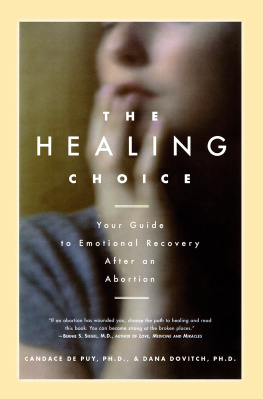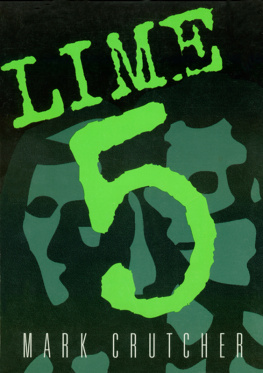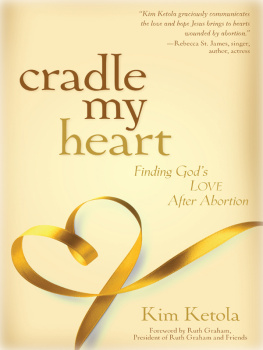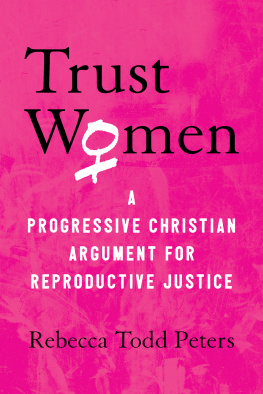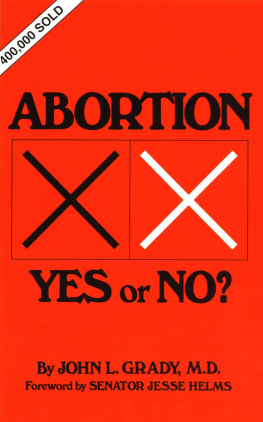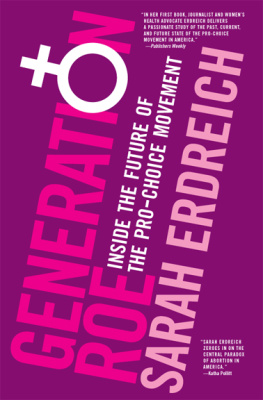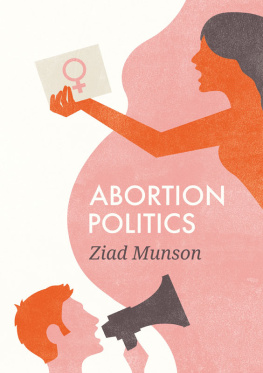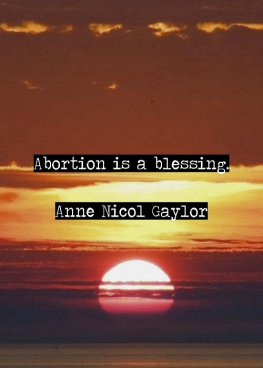Thank you for downloading this Touchstone eBook.
Join our mailing list and get updates on new releases, deals, bonus content and other great books from Touchstone and Simon & Schuster.
C LICK H ERE T O S IGN U P
or visit us online to sign up at
eBookNews.SimonandSchuster.com

Contents

Dedication
We dedicate this book
to our parentswith love.
Lorraine De Puy and Thomas De Puy
Phyllis and Victor Dovitch

Acknowledgments
We thank you, Candice Fuhrman, Linda Michaels, Haden Blackman, Becky Cabaza, Donna Beech, Robert Gordon, Angela Bonavoglia, Jane Johnson and Connie Zweig, for guiding us through this project.
We thank you, the doctors, nurses, psychotherapists and counselors who freely gave us their valuable time and shared their knowledge: Gary Schneider, O.D., Robin Schwartz Kapper, MFCC, Gayle Pepper McClean, RN, Michael Frank, MFCC, Michael Gross, M.D., Mary Schmitz, Ph.D., Leslie Eichenbaum, Ph.D., Jenny Soriano, M.D., and Sherry Goldman, R.N. We also extend our gratitude to the many health-care workers who helped us and who wished to remain anonymous.
Soul encouragement and nurturing came from our friends and loved ones. We thank you, Janet, Pete, Kitty, Clare, Dennis, Don C., Don G., Tony, Dawn, Kathy, Mollie, Stacey, Jon, Virginia, Jerry, Stephanie, Patty C., Patty H., Aaron, Liz, Natalie, Joan, Fred, Deliane, Elizabeth, Minnie, Max and Birdie for being there unendingly.
Our sisters, Michele, Debby and Diana, we couldnt have done it without you. Our brothers, Herb and Dagoberto, thanks for being in our corner. Ric, thank you dearly for enduring the long hours away.
Most of all, we deeply thank all the women who gave us their time, their hearts, their wisdom and their insights. Your interviews served to inspire and create this book.

Introduction
Abortion is not a frivolous choice. No woman sets out to create, then terminate, a possible life; but, over the centuries, millions of women have had abortions, and millions more will continue to terminate unwanted pregnancies regardless of social, religious or legislative opinion.
This book is for any woman who feels psychological pain from her past abortion, any person who has strong feelings about abortion, any person who sees abortion as killing a child, and anybody who feels sure it is not. It is a book that lends insight and offers helpful ways to achieve post-abortion healing. This is not a book about judgment, politics or religion. It is not a book about right or wrong.
Psychological studies show that only 9 percent of the 1.2 million American women who undergo abortions every year experience severe emotional difficulty following the procedure, and those women were most often psychologically unstable prior to their pregnancy. Unfortunately, most studies dismiss the other 90 percent of women as if they had no reaction whatsoever. Because the majority of women move forward with their lives, any normal grief, confusion or ambivalence they might feel is dismissed.
In reality, women who find themselves confronted with the decision to abort do not always walk away from the experience unscathed, even though they move forward with their lives. As psychotherapists, we see such women in our practices every day. Many women acknowledge a feeling of relief after their abortion, yet are understandably upset by facets of the experience that they had never anticipated. Many are distressed and unaware of the ways in which their choice has changed their lives and, sometimes, the lives of those around them. Many have been unwilling to speak of their choice in a world that is openly conflicted about abortion. Many are wracked with religious guilt and a fear that they have killed an unborn child. These reactions are not felt on the day of the abortion, but may arise over timesometimes years lateras women reflect back upon their experience.
Beneath the clamor of the abortion debate, the quiet impact abortion has on the psychological life of the woman who makes this choice has gone unheard. There is no cultural acknowledgment that she may have struggled over her decision or felt bereaved, or that the event may have left her with pain. Thus, abortion remains a significant personal experience that is not publicly recognized, socially sanctioned or frankly shared in the way a divorce, the death of a loved one or a miscarriage might be. A womans emotional journey from conception to termination is often left buried in her psychological underground. As she fights the external stigma, she struggles to understand her internal process, but without a charted course for healing, she has little guidance to explore, integrate or resolve her feelings.
Emotional restoration after an abortion is a unique challenge because the emotions a woman experiences are the result of a choice she made. Paradoxically, her healing journey requires yet another significant choicea healing choice. She can either live with the unresolved memories she may have struggled to hold at bay, or she can decide to go forward, look inward and reexamine herself. To find resolution, she must acknowledge feelings and recollections, even though it is tempting to fantasize that emotions will magically resolve themselves with time.
This healing journey asks a woman to: reflect upon the circumstances and reasons for her decision; explore the emotions that led to and resulted from her abortion; examine relevant issues arising from both her family of origin and the culture in which she was raised; and realize how the overall experience may have impacted her life then and now by recognizing what she lost and what she has gained.
In an era when people are talking on national television about difficult and formerly taboo subjects, such as sexually transmitted diseases, rape and incest, it is time that post-abortion recovery be brought out from under the cloak of fear and controversy. We believe it needs to be looked at squarely and addressed frankly.
The Creation of This Book
The idea for this book arose out of our clinical relationships with female clients whose lives had been touched by an abortion. As mental health professionals, we were concerned to find how few had discussed the life-changing decision they had made. When they began to share their stories, nearly all were surprised by the depth of emotion they still felt. Even those individuals who had never experienced post-abortion pain were moved by the realization that this singular action had allowed them to create important options and changes in their lives.
To encourage our clients healing we tried to locate helpful books they might read on post-abortion recovery. When we found that none existed, we set out to write one.
The data we collected came out of in-depth interviews with forty women who had experienced one or more abortions. The women ranged in age from eighteen to seventy-five and were from varied religious and ethnic backgrounds. More than half the women had never experienced psychotherapy. Each interview was composed of fifty-three questions regarding a womans familial, cultural and religious background; the circumstances in her life at the time of her pregnancy and abortion; her experience of pregnancy and the abortion procedure; and general feelings concerning shame, anger, regret, relief, the grieving process and acceptance. We also interviewed five men. The majority of questions elicited narrative responses rather than simply yes or no answers. In order to protect the anonymity of the participants, their names and certain details about their lives have been changed.
Next page
